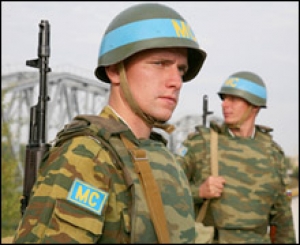
In explaining President Vladimir Putin's decision, which calls for establishing formal ties with businesses and organizations in the pro-Moscow breakaway provinces of Abkhazia and South Ossetia, Deputy Foreign Minister Mikhail Kamynin said the move "does not mean that Russia has chosen the course of confrontation" with Tbilisi.
Yet it comes just weeks after Georgia secured a pledge of eventual NATO membership during the alliance's Bucharest summit, and shortly after Tbilisi proposed a new peace plan for Abkhazia.
The United States, the European Union, and NATO have joined Georgia in condemning the step, which some observers believe is part of an attempt to derail the South Caucasus nation's attempt to join the Western alliance.
"This is an attempt to provoke the Georgian leadership into some kind of inappropriate reaction," Tbilisi-based political analyst Petre Mamradze, who formerly served as President Mikheil Saakashvili's chief of staff, tells RFE/RL's Russian Service. "This is what they are trying to do. As far as the de facto situation goes, Abkhazia and South Ossetia have already been under direct Kremlin rule for a long time. These actions just formalize the conditions have already existed."
For years, Russia has been issuing passports to Abkhaz and South Ossetia residents. In March, Moscow announced that it was unilaterally opting out of a CIS a ban on trade and travel with Abkhazia. Russia has also said it was considering establishing some form of diplomatic representation in the two regions.
Russian Peacekeepers
Moreover, Russia has thousands of troops in the two provinces, ostensibly serving as peacekeepers.
Nino Nakashidze, chairwoman of the Georgian parliament's Committee for European Integration, tells RFE/RL's Russian Service that Moscow's moves in favor of the separatist authorities creates -- at best -- a conflict of interests for these troops.
"Russia is always trying to create some kind of so-called legitimate authority [in Abkhazia and South Ossetia]," Nakashidze says. "This is carried out through such methods as, for example, giving [residents of these regions] Russian citizenship and passports so Russia will have a legal basis to say they are defending their citizens' interests in Abkhazia and South Ossetia. But excuse me, please, how then can Russian peacekeepers there be neutral if they are defending the rights of their citizens? Such double standards have always existed in Abkhazia and South Ossetia. Putin's recent actions are direct interference in the internal affairs of another state."
Observers say Moscow's real interest is not to annex Abkhazia and South Ossetia, but rather to keep the conflicts simmering in order to derail Georgia's NATO bid.
"It is difficult to say how this affects Georgia's NATO bid," says Moscow based political analyst Dmitry Babich, who writes for the magazine "Russia Profile." "On one hand, neither the European Union nor the United States are prepared to send their troops to resolve territorial problems in Georgia. On the other hand, if Russia remains active in Abkhazia and South Ossetia, this will only heighten the West's desire to defend Georgia in its disputes with Moscow."
De facto Abkhaz President Sergei Bagapsh has accused Georgia of deploying troops on the border with the breakaway region and warned that he would "take appropriate measures" if they were not withdrawn.
Georgian Reintegration Minister Temor Iakobashvili responded within hours by denying the allegation during a briefing in Tbilisi. "The Georgian government has not deployed any armed forces either in Kodori Gorge, or in Zugdidi. This can be verified by the UN monitoring mission, which is present there," he said. "At the same time, we believe such statements, and ultimatum-based talks, represent attempts to provoke Georgia into an armed conflict, or military actions of some sort. The most deplorable fact is that the Abkhaz and the Ossetians are being used as bait in these ploys."
Abkhazia and South Ossetia declared independence from Georgia after the Soviet Union broke up in 1991. Tens of thousands of people were killed and hundreds of thousands of Georgians fled the two regions and are currently internally displaced.
RFE/RL's Russian and Georgian services contributed to this report
